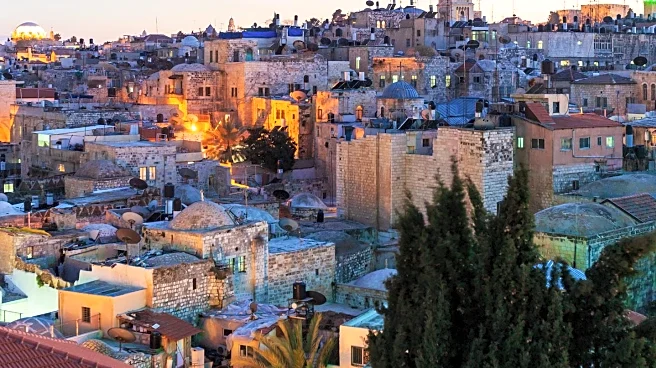What's Happening?
Yehuda Ne'eman, a 13-year-old boy, marked his bar mitzvah by wearing the tefillin of his late father, Dr. Eitan Ne'eman, at Soroka Medical Center. Dr. Ne'eman was a senior pediatric intensive care physician
and a reserve IDF major who was killed in combat near the Gaza border two years ago. The ceremony took place at the same hospital where Dr. Ne'eman saved lives and where Yehuda's life was saved twice. Yehuda's father was known for his dedication to medicine and his service in the IDF, having treated wounded soldiers before being called to reserve duty, where he was killed. The bar mitzvah ceremony was attended by family, friends, and colleagues, closing a circle of life, healing, and remembrance.
Why It's Important?
This event highlights the personal and communal impact of military service and loss. Dr. Ne'eman's legacy as a healer and soldier is honored through his son's bar mitzvah, symbolizing continuity and resilience. The ceremony underscores the deep connections between family, community, and national service, reflecting the sacrifices made by military families. It also emphasizes the role of Soroka Medical Center as a place of healing and remembrance, reinforcing the importance of medical professionals in both civilian and military contexts.
What's Next?
Yehuda Ne'eman's bar mitzvah marks the beginning of his journey into adulthood, carrying forward his father's legacy. The event may inspire further community support for families of fallen soldiers and highlight the ongoing need for medical and emotional support for those affected by conflict. Soroka Medical Center may continue to serve as a focal point for such commemorative events, strengthening its role in the community.
Beyond the Headlines
The ceremony reflects broader themes of faith, gratitude, and resilience in the face of loss. It highlights the cultural significance of bar mitzvahs as rites of passage and the importance of family heritage. The event also raises awareness about the challenges faced by military families and the need for societal support in honoring their sacrifices.









